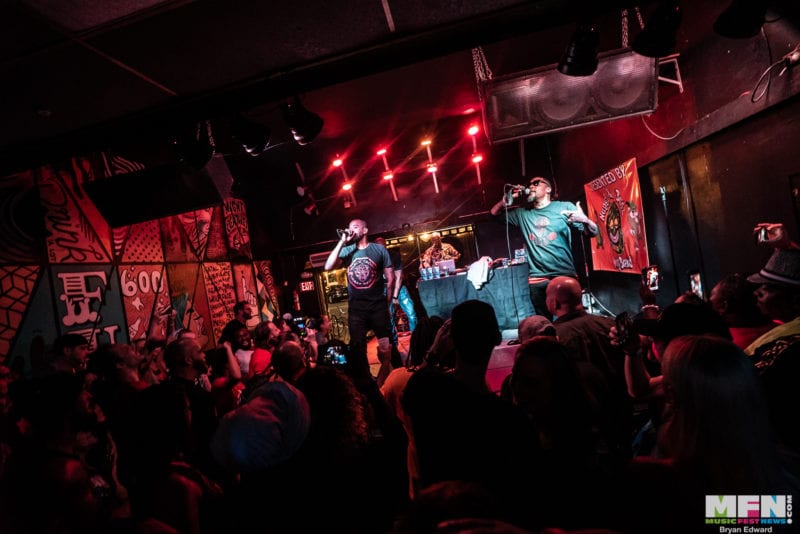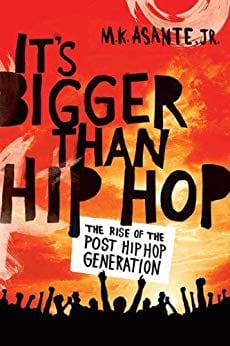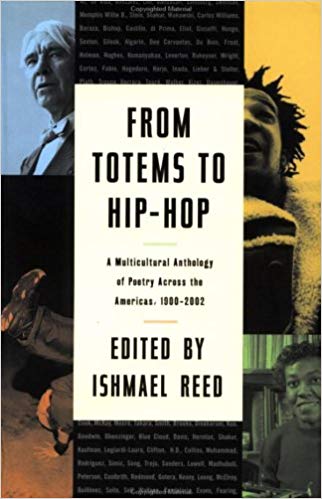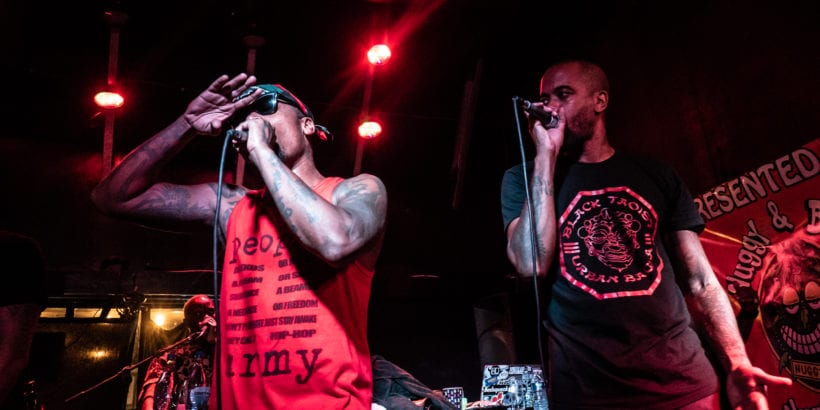
The Personal is Political: Dead Prez and the Legacy of Revolt in Hip Hop
Blessed are we who dare to be free
We gotta change the way we behave
You gotta sacrifice for our righteous cause
Or remain a passive slave
Just understand we’re pro-black
And we’re against any one or thing
That tries to hold us back
So think but don’t take too long
The time is getting late
And DJs if you got a mic
It’s your job to educate
Brother D with Collective Effort, “How we Gonna Make the Black Nation Rise?” (1980)
For nearly the past 50 years, from Gil Scott Heron’s 1971 progenitorial spoken word recording Pieces of a Man, which included the fabled “The Revolution Will Not Be Televised,” and Grandmaster Flash and the Furious Five’s “The Message” in 1982, considered the first socially conscious rap to be promoted commercially, to Childish Gambino’s recent scathing hit, “This is America,” critiquing the contemporary social and political climate, hip hop has been at the vanguard of expressions of cultural dissatisfaction with an eye always aimed toward emancipation and revolt. Nestled closely to the middle of that time-line are the no less revolutionary Dead Prez, formed in 1996 by M-1 (Mutulu Olugbala) and stic.man (Khnum Muata Ibomu), who performed this past Friday at downtown St. Petersburg’s Fubar. Fubar was pleased to have Dead Prez for the second year in a row, saying they are “very humble and really enjoy being able to have these shows for this city and allowing people to still see an act like Dead Prez.”
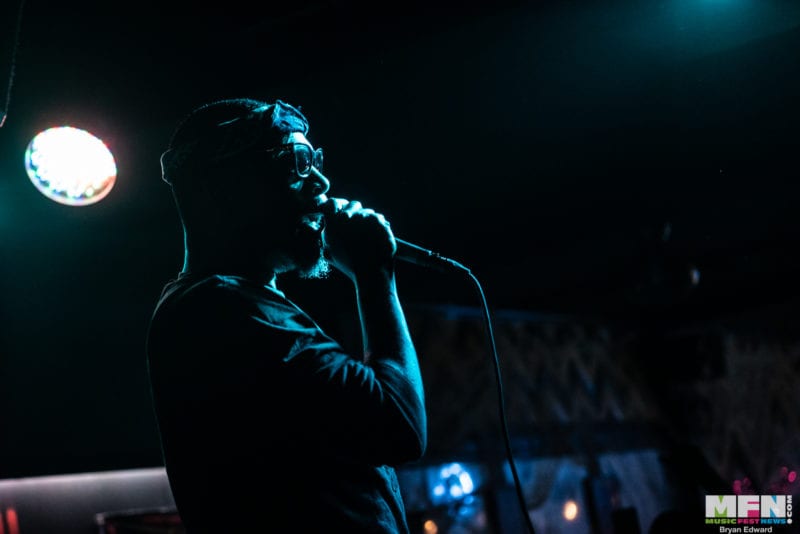
This was one of the most intense shows I have ever attended due to the passion of the artists, high energy of the however small crowd, and intimacy of the venue. Some of the earlier acts were questionable given the style of the much-anticipated headliner, but others such as HeyeYella, Fxul Mxuf, and Hoy Polloy brought lyrically conscious skill and energy to the sometime waning crowd. There was about an hour between the last set and when Dead Prez were to take the stage, which sapped the audience of some verve, but by the time they hit the stage the crowd re-emerged to greet them. Joined by their comrades Larcen, Coach Nym (sporting a “Healthy Gangsta Lifestyle” shirt), and DJ and MC Mikeflo, Dead Prez would take interludes from their songs to diagnose the U.S. as suffering from a heart disease onset by the glutinous greed of the 1%, speaking up for Palestinians and the struggles south of our border, as well as meditating on how we have evolved from the information to the application age.
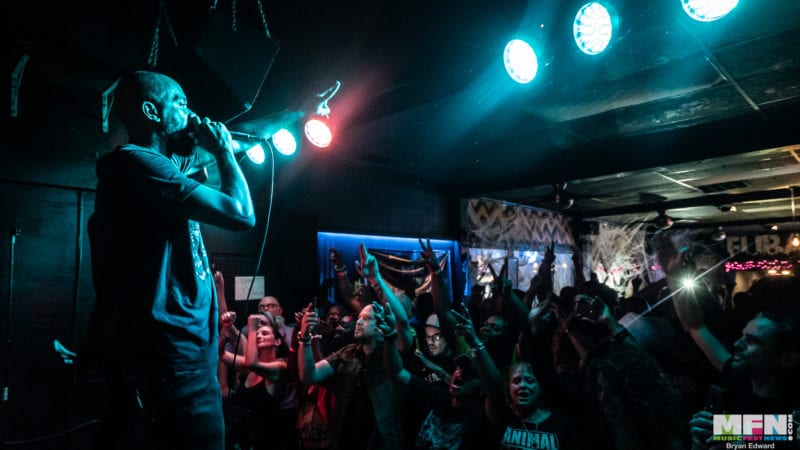
Any serious study of hip hop’s legacy of resistance to the backward forces still prevalent today would be severely lacking were it to overlook this duo. In 1857 Frederick Douglas gave his “West India Emancipation,” speech which included some of his most quoted lines: “Power concedes nothing without a demand. It never did, and it never will. Find out just what any people will quietly submit to, and you have found out the exact measure of injustice and wrong which will be imposed upon them, and these will continue till they are resisted with either words or blows, or with both.” Dead Prez come at the problem from both ends – loudly and not reticent in word nor shy of hand. Sporting their “fit-hop” message, Dead Prez did not fail to promote healthy living and self-transformation at Friday’s show.
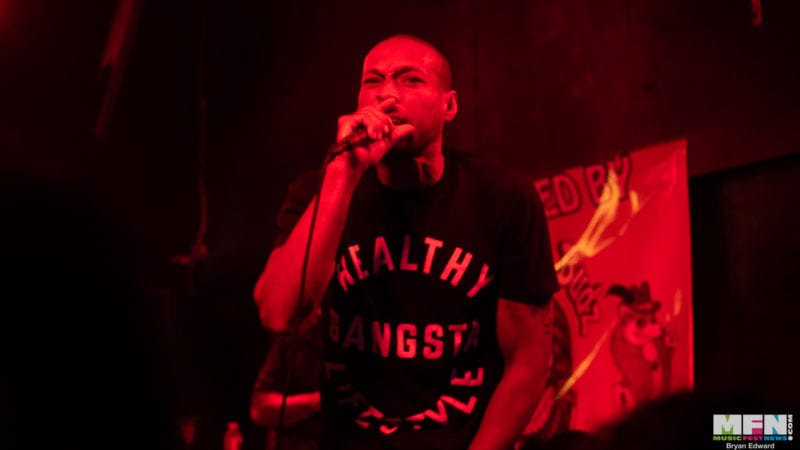
But I would be remiss if I were to take credit for knowledge of that quote by sheer virtue of my omniscience. No, this quote was revealed to me by M. K. Asante, Jr., in his book It’s Bigger than Hip Hop: The Rise of the Post-Hip-Hop Generation. In this book, Asante explores the self-fulfilling stereotypes that have both historically empowered and oppressed black communities. The endemic violence, homophobia, misogyny, and consumerism of mainstream hip hop is a carefully crafted image by the entertainment industry to sell an image of minstrelsy and fear of poor communities that become recycled back into those very communities in an attempt to get by through the conditions of survival. Dead Prez take their rhymes, however, and reject the tropes of prejudice in favor of community organizing and an appeal towards personal growth not constrained by the confines of the label “conscious” rappers.
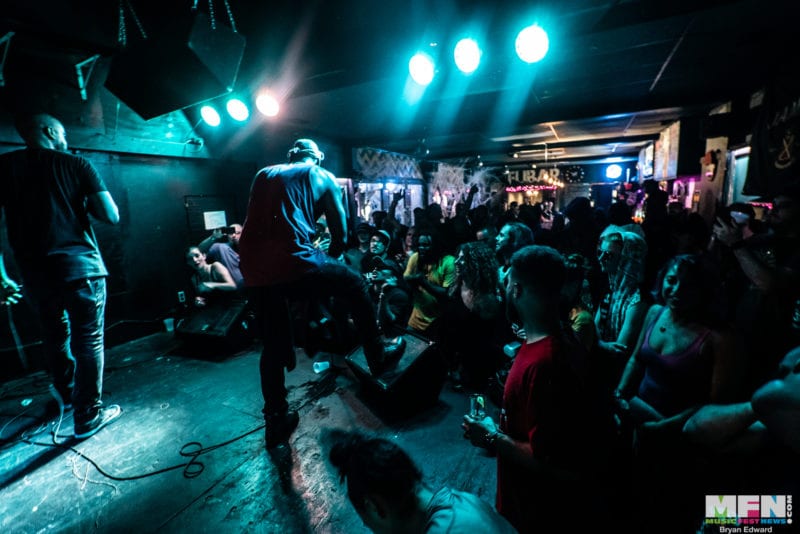
For a long time, I was turned off from hip hop for these aforementioned-listed reasons in favor of its nü-metal alternatives like Rage Against the Machine and System of a Down. Having attended a predominately white middle-class high school, I was perplexed by the glorification of seemingly racist stereotypes which had no grounding in our lived experience. I would go to house parties in multi-million-dollar homes where kids would pride themselves on how “thug” they were, internalizing the glorification of street life despite never having had to live with the consequences of it. Having grown up on the southwest side of Chicago, although sheltered in the relatively calm outer suburbs, I remember the unglamorous conditions of redlining and rampant discrimination still endemic to the only nominally desegregated northern schools. In the collab with Outlawz, stic.man raps in the verse of the song “How you Like That:”
Meanwhile deep down on the other side of town
Peep how white boys wanna be black
If you really could take a pill for the day
Would you really like to see what it feel like to be black
First stop is the hood, where the weed at
Put it in your sock so the cops don’t see that
Roadblock on the block, now you lookin’ down the barrel of a Glock
So far how you like that?
Now you’re headed to the jail, locked down in a cell
Conspiracy to sell, no lawyer, no money for the bail
And who you gon’ tell that you here, nobody don’t care
Do you love that?
Gotta deal with the judge and the judge got a grudge
Now you wanna rub off the black and go back to the cracka that you was
Thought you wanna be one of us, cause you forgot that
Everyday in my hood it be like that, you can switch back
But for me it ain’t like that, can you feel that?
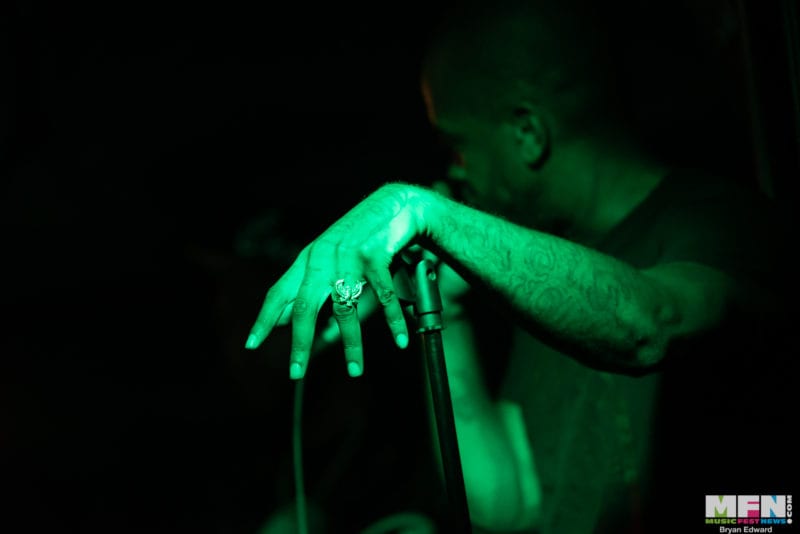
It wasn’t until I was turned onto the more underground avenues in the DIY tradition of Afrika Bambaataa-lead Universal Zulu Nation community-building and consciousness-raising resistance to the hegemonic capitalist superstructures overseeing the music industry that I became enamored with the genre. I was moved by such figures as MC Sole and his Solecast podcast and other militant counter-culture revolutionaries like Native American hip hop artist Ant Loc of Savage Family, who performed ad hoc shows at the Standing Rock resistance movement, not to mention Dead Prez, who maintain their own podcast, The RBG Fit Club. The truth is, although freedom of expression is protected by our constitution from acts of government, nothing prevents corporate censorship. Independent platforms may offer an avenue for transgressive acts to get out their word, but without the resources of the major players it can be incredibly difficult to gain the worthy attention given the saturation of performers.
Assante describes two such examples in his book of how people of color have been blocked from the public eye by acts of back-ended censorship whenever they can’t be silenced through sheer intimidation. Many of these militantly defiant rappers are omitted from mainstream distribution without so much as a comment, like the omission of Mos Def’s song “The Rape Over” from his album The New Danger, which criticized the white corporate takeover of the hip hop industry that ultimately dictates hip hop culture. Or much like poet laureate of New Jersey Amiri Baraka, who upset the constituents with his radical politics so much that the governor opted to dissolve the position itself, lacking the power to fire Baraka from his historic post as poet laureate.
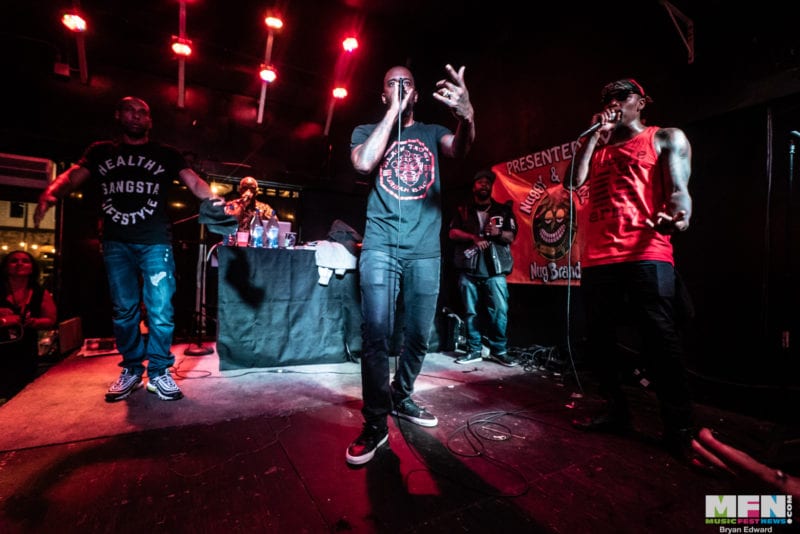
Back: Coach Nym, DJ Mikeflo, and Larcen
For here’s the thing: it is a sign of privilege to be apolitical. For oppressed peoples, the very act of existence, of stepping out of the shadows or drawing any attention to themselves whatsoever, even so much as driving a car, is a political move. Those hip hop artists who succumb to the market pressures of glorifying the image of the black super-predator, which young white men (who compose the bulk of hip hop’s target audience) buy into and emulate in an attempt to appear “tough” out of some sort of fungible pseudo-street cred out of which they find legitimacy for their own ingrained prejudices, only perpetuate the white supremacist image of the inferiority of minorities. It is not enough to be impartial; one has to either choose to fight for the rights of oppressed peoples or consent to their subjugation; silence is complicity and often even contributes to it. Dead Prez are painfully aware of this fact, and as such make it a point to be conscious of both what they do and what they do not say in their music.
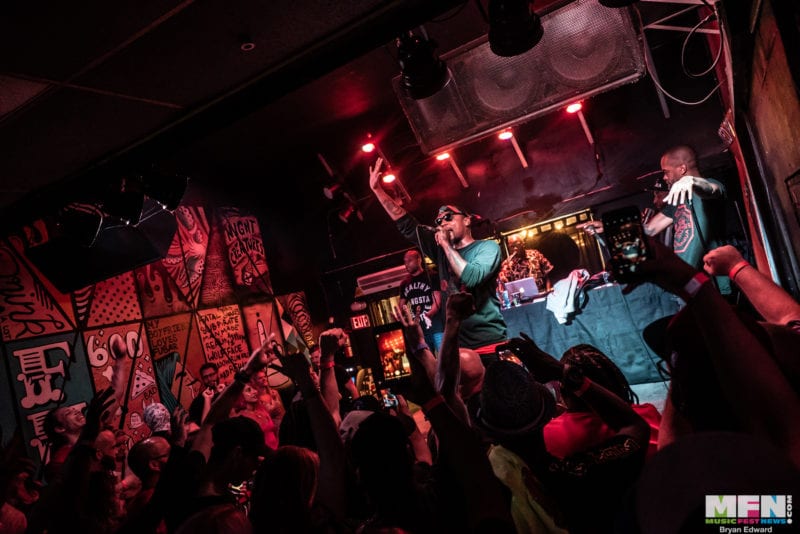
Back: Coach Nym and DJ Mikeflo
The sad reality is that our institutions are missionary in nature and teach that history doesn’t begin until the settlers have arrived. In the introduction to his multicultural anthology of American poetry From Totems to Hip-Hop, Ishmael Reed describes this bias against artists of color:
“…at one time women were required to be modest and quiet, to avoid appearing ‘shrill.’ This is still true for African Americans and other multicultural authors. We are told in a thousand ways that we shouldn’t draw on the full range of human emotions when writing poetry. That we shouldn’t be angry… We were warned in Henry Louis Gates Jr.’s ‘Fourth Renaissance’ manifesto that we shouldn’t be too anxious or difficult. We shouldn’t alienate the public, which pays the freight. We should cross over, caress the suburbanites and sell them guilt-free products. Tell them that the problems of millions of blacks and Hispanics are self-inflicted.”
Likewise, rapper La Marea Veulve, in the recent sub.Media mini-documentary on hip hop, echoes this idea when she describes how her art is not about describing to outsiders in a palatable way her reality but is rather there to empower others like her who feel the same way and provide validation for those who too often are expected to curtail how they feel so as to not discomfit those who hold their lives in foreign hands. For marginalized peoples, the personal is political, for even how they go about expressing themselves is tailored to not alienate those in charge. This is what makes hip hop such a vital source of inspiration to resistance, because it is rooted in the lived experiences of those on the front line.
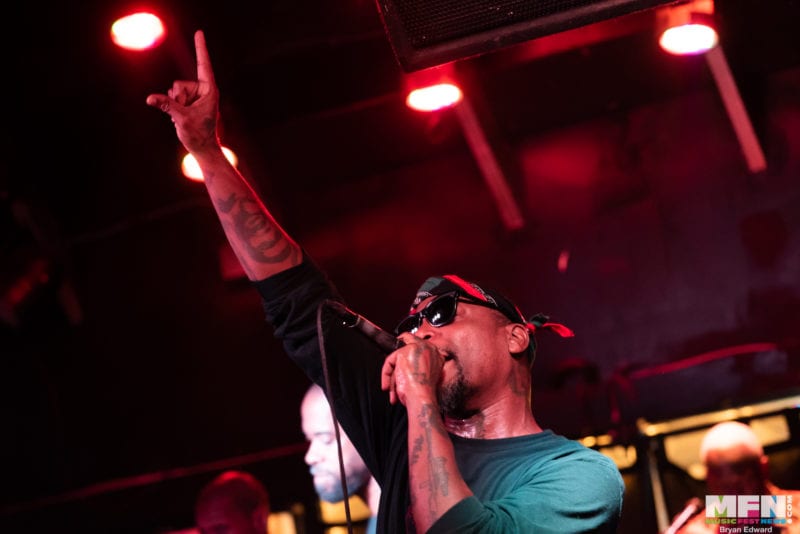
All of this considered, seeing Dead Prez this weekend was by far the highlight of my year. Getting a chance to see these legendary artists speak truth to power and to feel “Revolutionary but Gangsta,” even for just the hour and a half that they performed, was a transformative experience. So much of what is available for consumption is tailored towards not causing indigestion to the powers to be. Dead Prez have been flagrantly disregarding the comfort of whomever may be concerned for the sake of mindful transgression and speaking up for others who have been marginalized and oppressed. This was a rare opportunity, and although it was a considerably small crowd who attended, Dead Prez didn’t hold back an inch and made sure all of those involved effectively and affectively heard their message, which has only intensified over the past twenty years that they’ve been working together.
